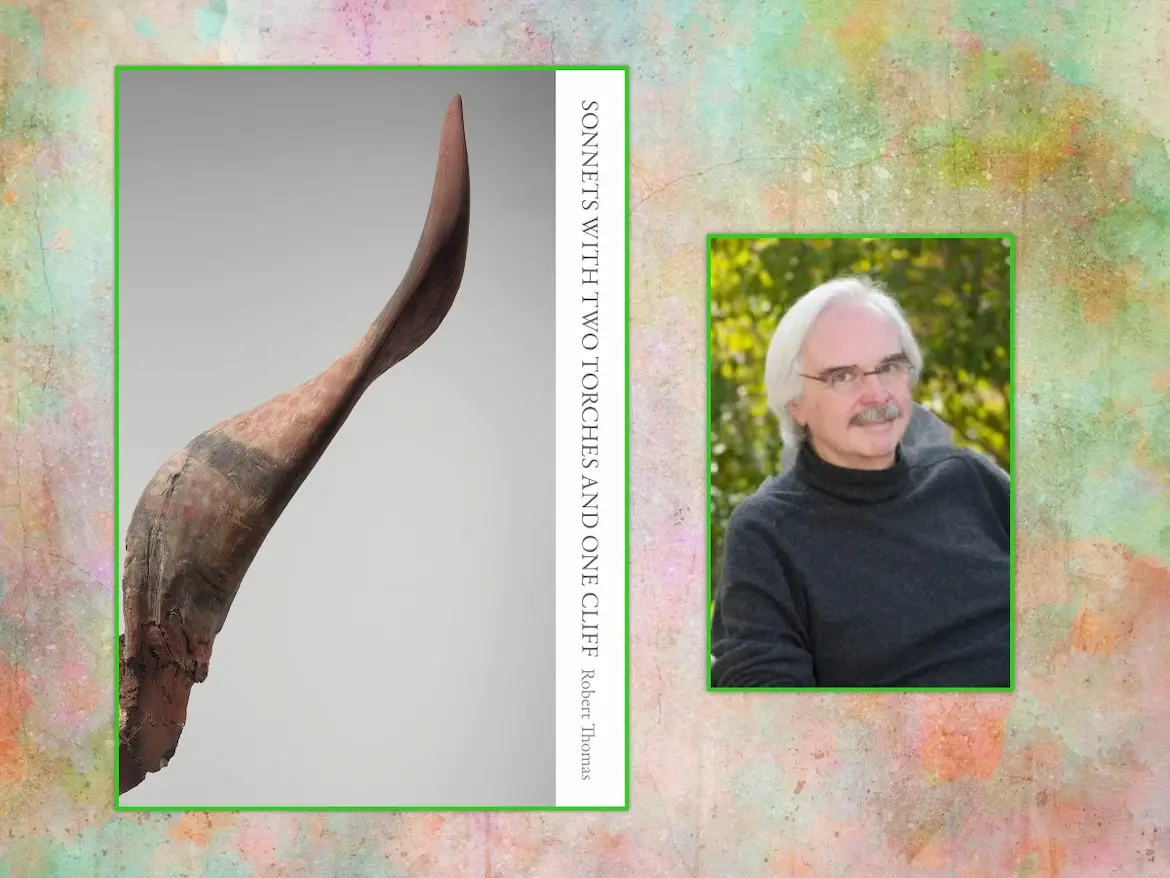In keeping with LitStack’s commitment to review books of poetry and poetry chapbooks, we are very pleased to bring you poet Kathy Nelson’s review of Sonnets With Two Torches And One Cliff, by Robert Thomas.
In This Review of Sonnets With Two Torches and One Cliff:
An Exploration of Jealousy, with Mozart and Karl Ove Knausgaard
“I was sure you met him for crab sliders / and gin slings at that bar on Mission Bay,” (“Sonnet with Slings and Sliders”) laments the jealousy-besieged speaker of Robert Thomas’s Sonnets with Two Torches and One Cliff. The poet reminds us in his end notes that “Jealous love is a traditional theme of sonnets,” and, indeed, these sonnets are traditional not only in theme but also, mostly, in form. With a richly detailed, specific and thoroughly inventive imagination, the speaker of these poems recounts the intimate tortures of jealousy in eighty precise and exhilarating sonnets. They continually surprise with their imagery, with their daring and revelatory metaphors, with their sly humor, with their wordplay and sound play.
In “Sonnet with Mozart and Bear,” the speaker, addressing the object of his ardor, expresses raw jealousy, comparing himself unfavorably to his imagined romantic rival.
I’m sure he’s the real
deal, the pith of the myth, the fanged Wolfgang
to my toothless Salieri. […]
Your ram pens Hamlet for his restless ewe.
I hem and haw with the mule in the barn.
Salieri to his rival’s Mozart, a hesitant and wordless barn-dweller to his Shakespeare, the speaker always comes up short. But the speaker’s self-deprecation is delivered with humor achieved through expertly timed assonance and alliteration and through the speaker’s extravagance in identifying his antagonist with such timeless cultural icons.
Another literary luminary, Karl Ove Knausgaard, is the imagined romantic adversary in “Sonnet with Venison and Frigg.” The speaker’s colloquial irreverence works alongside alliteration to create a jocular tone.
How can I compete with his rough-hewn looks?
For Frigg’s sake, how can I hope to survive
my struggle with a man with a double-
voweled name? While I polish my language
with lambskin and linseed oil, you’re gutted
by his wild syntax, his rugged diction
cutting your hand as you dog-ear the page.
In this sonnet, romantic rivalry is layered with the literary rivalry between poets and novelists. The image of polishing “language / with lambskin and linseed oil” will delight any reader who happens to be, herself, a poet.
It’s noteworthy that these two poems illustrate Thomas’s originality with regard to the sonnet form. In “Sonnet with Mozart and Bear,” the volta occurs at the traditional octave-sestet divide, whereas in “Sonnet with Venison and Frigg,” the turn occurs in the less traditional exact middle of the poem. While he preserves the outer constraints of the sonnet form (fourteen mostly pentameter lines), Thomas varies the form over the course of the collection, adding interest and avoiding uniformity.


From Sailing to Deboning a Turkey: The Many Metaphors for Sex
The inventiveness of metaphors is one of the more memorable aspects of these sonnets. Thomas’s wide-ranging imagination not only creates an encyclopedia for the sexual experience but also infuses his poems with a delightfully humorous tone. In “Sonnet with Zipper and Bioluminescence,” for instance, the rival is so young “you could / show him not just the ropes but the rigging, / sheet and mainsail, jib and spar.” And of the potent sex, the speaker imagines:
You did it all:
the winch, the wheel, the sextant, celestial
navigation. With him you saw the red
tide and a redder sunrise.
With the expansive list of sailing vocabulary and innuendo, the poem becomes a compendium of sexual delights delivered with humor.
Over the course of the collection, the very accumulation of metaphors for sex becomes a source of delight. “He knew how to put you back together / after the deboning, like Julia Child / did with a Thanksgiving turkey” is juxtaposed with “After lunch he took you to buy a car, / got you a deal that made you cry Olé!” (“Sonnet with Used Car and Julia Child”). Or sex is a jazz improvisation, as in “Sonnet with Purgatory and Scratch”:
You did it to my percussion, dovetailed
my rhythm. It was my snare and my steel
pans, my glass harp and gutbucket. To my
brush and scratch you kept such smooth time, one time.
The metaphors for sex simply tumble from one to the next, one image calling forth the next, suggesting the varieties of the rival’s sexual creativity, as in “Sonnet with Rain Dance and Gitanes”:
But the one with iridescent wings
on his cock, the five octaves he can sing
with it, the one whose dancing calls forth five
forms of precipitation, from drizzle
to downpour to hail, and each more wanton
than the last, on the parched grass where you live.
The multiplicity and variety of metaphors for sex evoke the speaker’s obsession with his rival’s sexual prowess while, at the same time, creating, purely through cleverness and excess, a hilarious list. We marvel and guffaw at the speaker’s irrepressible fixation.


The Final, Excruciating Envy
Envy goes beyond the human, sexual realm. In “Sonnet without Mark or Manger,” an irreverent Joseph protests his subordinate role in the drama of Christ’s birth:
Now she wants me to build a cedar bed,
not for us of course—for him, his divine
baby fat.
Joseph’s resentment of the baby Jesus reflects his jealousy of God himself:
Sacred freak!
A constant reminder my virgin wife
knows what it is to know God, the searching
lunge of his tongue. All I can do is watch
him slobber, gorge, and grow large at her breast.
The vitriolic insult, the sexual imagery, the internal rhyme all work together to create a true human voice and its honest expression of spiritual envy.
“The final, excruciating envy / is of those with faith,” Thomas’s speaker tells us (“Sonnet with Warm Milk and Shovel”). The poet depicts this envy in “Sonnet with Ham and Rose”:
I see God as a sort of rectangle
of rose light, and the light is paper-thin—
[…] Not that I believe in that sheer
page of light but that’s how I imagine
those who’ve seen God see everything: the pots
on the range, clouds, streets with garbage cans
at random intervals, silent at dawn
before the truck’s high-pitched whine. I envy
those who see it.
Using images (some only one word, some in narrative vignettes involving multiple senses) of the everyday, the poet imagines the faith he envies others.
Though the topic is no longer sexual betrayal, the ruminations on faith are still expressed in the vocabulary of envy. In “Sonnet with Sappho and Wrecking Yard,” even death is configured as a rival.
I can’t compete with him, Lord Rigor Mort.
He seized you the way a crane plucks a car
and dumps its steel into the wrecking yard
crusher […]
All I can give you is doubt,
[…]
not his loud and garish fire of sunset,
not its crash, its drop-dead gorgeous knockout
burst. How could you resist?
While the majority of sonnets in the collection concern jealousy in romantic love, these poems that deal with spiritual envy operate in another dimension, providing depth to the collection.
Sonnets with Two Torches and One Cliff is a delight. It both pushes the confines of the sonnet with metaphorical exuberance, word choice and irreverence and, at the same time, makes use of the sonnet’s long history in the depiction of envy. This collection from this fine poet is both funny and horrifyingly familiar to anyone who has experienced jealousy, either romantic or spiritual. And haven’t we all?
~ Kathy Nelson
About Poe Robert Thomas
Robert Thomas’ latest book is Sonnets with Two Torches and One Cliff (Carnegie Mellon University Press, 2023). His previous book Bridge was a lyrical novella published by BOA Editions, Ltd., and won the 2015 PEN Center USA Literary Award for Fiction. His first book, Door to Door, was selected by Yusef Komunyakaa as winner of the Poets Out Loud Prize and published by Fordham University Press, and his second book, Dragging the Lake, was published by Carnegie Mellon University Press. He has received a poetry fellowship from the National Endowment for the Arts and won a Pushcart Prize.
Robert lives with his wife in Oakland, California, in the house where he was born. He has lived many places in Northern California, including the North Beach, Russian Hill, Upper Market, Outer Richmond, and Inner Sunset neighborhoods of San Francisco. Following a distinguished tenure as a barista at Caffe Trieste (Allen Ginsberg said he made a great caffe latte) and a disastrous one as a waiter at Luigi’s, Robert worked for years as a legal secretary in San Francisco. One of Robert’s first inspirational teachers was poet Stan Rice, who loved to say “Neurons love metaphors,” “Pleasure measures,” and “If what you’ve written isn’t as good as Yeats’ ‘That dolphin-torn, that gong-tormented sea,’ keep working.”
You can find and follow Robert Thomas on his website.
Other Titles by Robert Thomas
About Our Guest Reviewer, Kathy Nelson
Kathy Nelson is the author of the full-length collection, The Ledger of Mistakes (Terrapin Books, 2023), as well as two chapbooks: Cattails (Main Street Rag, 2013) and Whose Names Have Slipped Away (Finishing Line Press, 2017). Her poems have appeared in Asheville Poetry Review, Southern Poetry Review, Tar River Poetry, Valparaiso Poetry Review, New Ohio Review, Rogue Agent Journal and elsewhere. She holds an MFA from the Warren Wilson Program for Writers.
You can find Kathy at her website.
Titles by Kathy Nelson
Other LitStack Resources
Be sure and click over to other LitStack reviews of poetry to find the perfect companion, and be sure to check out Kathy Nelson’s review of About Time, and then read a review of Kathy’s book The Ledger of Mistakes.
As a Bookshop, BAM, Barnes & Noble, Audiobooks.com, Amazon, and Envato affiliate, LitStack may earn a commission at no cost to you when you purchase products through our affiliate links.







